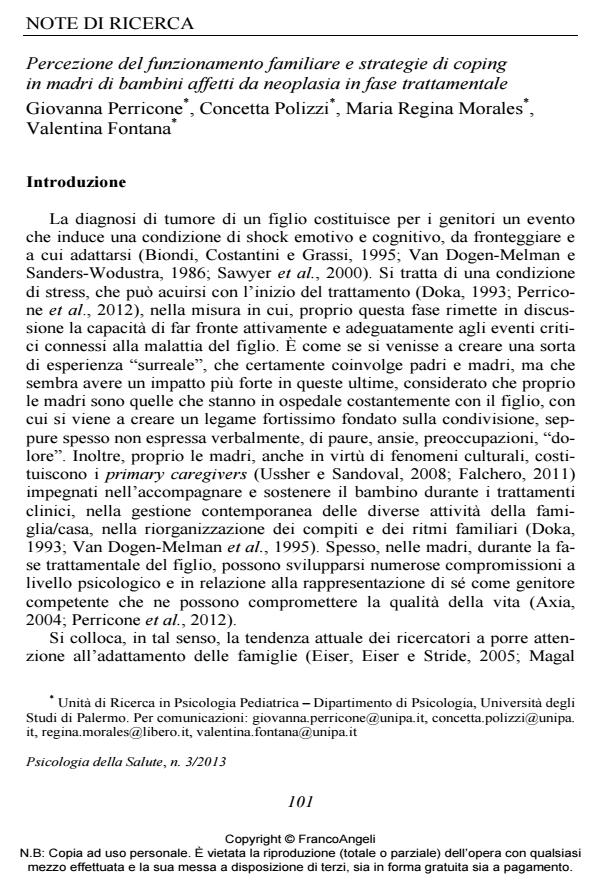Percezione del funzionamento familiare e strategie di coping in madri di bambini affetti da neoplasia in fase trattamentale
Titolo Rivista PSICOLOGIA DELLA SALUTE
Autori/Curatori Giovanna Perricone, Concetta Polizzi, Maria Regina Morales, Valentina Fontana
Anno di pubblicazione 2013 Fascicolo 2013/3
Lingua Italiano Numero pagine 13 P. 101-113 Dimensione file 387 KB
DOI 10.3280/PDS2013-003005
Il DOI è il codice a barre della proprietà intellettuale: per saperne di più
clicca qui
Qui sotto puoi vedere in anteprima la prima pagina di questo articolo.
Se questo articolo ti interessa, lo puoi acquistare (e scaricare in formato pdf) seguendo le facili indicazioni per acquistare il download credit. Acquista Download Credits per scaricare questo Articolo in formato PDF

FrancoAngeli è membro della Publishers International Linking Association, Inc (PILA)associazione indipendente e non profit per facilitare (attraverso i servizi tecnologici implementati da CrossRef.org) l’accesso degli studiosi ai contenuti digitali nelle pubblicazioni professionali e scientifiche
Il contributo presenta uno studio correlazionale sul rapporto tra specifiche strategie di coping di madri di bambini con neoplasia in fase trattamentale e la loro percezione del funzionamento familiare, in termini di coesione e adattabilità/flessibilità, muovendo dall’ipotesi che una relazione "virtuosa" tra le variabili considerate possa costituire una risorsa importante per la madre. Lo studio, che ha coinvolto un gruppo di 34 madri di bambini con neoplasia in fase di trattamento, ha previsto la somministrazione di due specifici strumenti: il Coping Orientation to the Problems Experienced -Nuova Versione Italiana (COPE-NVI), per rilevare le strategie di coping, e il Family Adaptability and Cohesion Evaluation Scale (FACES III), per misurare la percezione delle madri rispetto al funzionamento della propria famiglia, in relazione a coesione e adattabilità/flessibilità. I dati evidenziano correlazioni statisticamente significative di tipo positivo tra coesione familiare e strategia di orientamento al problema (r = 0.49, p < 0.05) e tra adattabilità/flessibilità e orientamento al problema (r = 0.36, p <0.01); e ancora, sono emerse correlazioni statisticamente significative di tipo negativo tra adattabilità/flessibilità e strategie di orientamento trascendente (r = -0.40, p < 0.01).
Parole chiave:Coping delle madri, funzionamento familiare, oncologia pediatrica, trattamento.
- Valutare il rischio bio-psico-sociale in oncoematologia pediatrica. Riflessioni sull'applicazione del Percorso Diagnostico Terapeutico Assistenziale (PDTA) della Regione Piemonte in psicologia oncologica: risultati preliminari Marina Bertolotti, Elvia Roccia, Giulia Zucchetti, Claudia Peirolo, Tiziana Geuna, Simona Bellini, Daniela Converso, in PSICOLOGIA DELLA SALUTE 1/2017 pp.145
DOI: 10.3280/PDS2017-001008 - Psychological Distress after a Diagnosis of Malignant Mesothelioma in a Group of Patients and Caregivers at the National Priority Contaminated Site of Casale Monferrato Michela Bonafede, Antonella Granieri, Alessandra Binazzi, Carolina Mensi, Federica Grosso, Gianluca Santoro, Isabella Giulia Franzoi, Alessandro Marinaccio, Fanny Guglielmucci, in International Journal of Environmental Research and Public Health /2020 pp.4353
DOI: 10.3390/ijerph17124353 - COPE-NVI-25: validazione italiana della versione ridotta della Coping Orientation to the Problems Experienced (COPE-NVI) Luca Caricati, Chiara Foà, Laura Fruggeri, Annalisa Tonarelli, in PSICOLOGIA DELLA SALUTE 2/2015 pp.123
DOI: 10.3280/PDS2015-002007
Giovanna Perricone, Concetta Polizzi, Maria Regina Morales, Valentina Fontana, Percezione del funzionamento familiare e strategie di coping in madri di bambini affetti da neoplasia in fase trattamentale in "PSICOLOGIA DELLA SALUTE" 3/2013, pp 101-113, DOI: 10.3280/PDS2013-003005